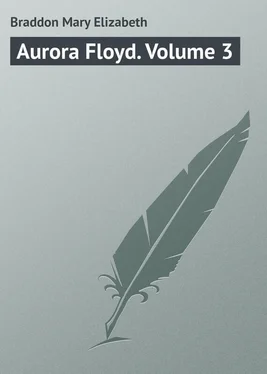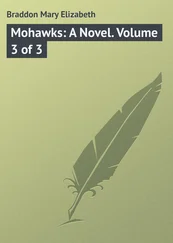Mary Braddon - Aurora Floyd. Volume 3
Здесь есть возможность читать онлайн «Mary Braddon - Aurora Floyd. Volume 3» — ознакомительный отрывок электронной книги совершенно бесплатно, а после прочтения отрывка купить полную версию. В некоторых случаях можно слушать аудио, скачать через торрент в формате fb2 и присутствует краткое содержание. ISBN: , Жанр: foreign_language, foreign_prose, на английском языке. Описание произведения, (предисловие) а так же отзывы посетителей доступны на портале библиотеки ЛибКат.
- Название:Aurora Floyd. Volume 3
- Автор:
- Жанр:
- Год:неизвестен
- ISBN:http://www.gutenberg.org/ebooks/48022
- Рейтинг книги:5 / 5. Голосов: 1
-
Избранное:Добавить в избранное
- Отзывы:
-
Ваша оценка:
- 100
- 1
- 2
- 3
- 4
- 5
Aurora Floyd. Volume 3: краткое содержание, описание и аннотация
Предлагаем к чтению аннотацию, описание, краткое содержание или предисловие (зависит от того, что написал сам автор книги «Aurora Floyd. Volume 3»). Если вы не нашли необходимую информацию о книге — напишите в комментариях, мы постараемся отыскать её.
Aurora Floyd. Volume 3 — читать онлайн ознакомительный отрывок
Ниже представлен текст книги, разбитый по страницам. Система сохранения места последней прочитанной страницы, позволяет с удобством читать онлайн бесплатно книгу «Aurora Floyd. Volume 3», без необходимости каждый раз заново искать на чём Вы остановились. Поставьте закладку, и сможете в любой момент перейти на страницу, на которой закончили чтение.
Интервал:
Закладка:
"Now," said John, rising and walking to the table as the door closed upon the constable, "now then, Mr. Hayward, let me see this paper. If it concerns me, or any one connected with me, I have a right to see it."
"A right which I will not dispute," the coroner answered gravely, as he handed the blood-stained document to Mr. Mellish. "I only beg you to believe in my heartfelt sympathy with you in this – "
"Let me alone!" cried John, waving the speaker away from him as he snatched the paper from his hand; "let me alone! Can't you see that I'm nearly mad?"
He walked to the window, and with his back to the coroner and Mr. Lofthouse, examined the blotched and blotted document in his hands. He stared for a long time at those blurred and half-illegible lines before he became aware of their full meaning. But at last the signification of that miserable paper grew clear to him, and with a loud cry of anguish he dropped into the chair from which he had risen, and covered his face with his strong right hand. He held the paper in the left, crumpled and crushed by the convulsive pressure of his grasp.
"My God!" he ejaculated, after that first cry of anguish, – "my God! I never thought of this. I never could have imagined this."
Neither the coroner nor the clergyman spoke. What could they say to him? Sympathetic words could have no power to lessen such a grief as this; they would only fret and harass the strong man in his agony; it was better to obey him; it was far better to let him alone.
He rose at last, after a silence that seemed long to the spectators of his grief.
"Gentlemen," he said, in a loud, resolute voice that resounded through the little room, "I give you my solemn word of honour that when Archibald Floyd's daughter married me, she believed this man, James Conyers, to be dead."
He struck his clenched first upon the table, and looked with proud defiance at the two men. Then, with his left hand, the hand that grasped the blood-stained paper, thrust into his breast, he walked out of the room. He walked out of the room and out of the house, but not homewards. A grassy lane, opposite the Golden Lion, led away to a great waste of brown turf, called Harper's Common. John Mellish walked slowly along this lane, and out upon this quiet common-land, lonely even in the broad summer daylight. As he closed the five-barred gate at the end of the lane, and emerged upon the open waste, he seemed to shut the door of the world that lay behind him, and to stand alone with his great grief, under the low, sunless, summer sky. The dreary scene before him, and the gray atmosphere above his head, seemed in strange harmony with his grief. The reedy water-pools, unbroken by a ripple; the barren verdure, burnt a dull grayish brown by the summer sun; the bloomless heather, and the flowerless rushes, – all things upon which he looked took a dismal colouring from his own desolation, and seemed to make him the more desolate. The spoiled child of fortune, – the popular young squire, who had never been contradicted in nearly two-and-thirty years, – the happy husband, whose pride in his wife had touched upon that narrow boundary-line which separates the sublime from the ridiculous, – ah! whither had they fled, all these shadows of the happy days that were gone? They had vanished away; they had fallen into the black gulf of the cruel past. The monster who devours his children had taken back these happy ones, and a desolate man was left in their stead. A desolate man, who looked at a broad ditch and a rushy bank, a few paces from where he stood, and thought, "Was it I who leapt that dike a month ago to gather forget-me-nots for my wife?"
He asked himself that question, reader, which we must all ask ourselves sometimes. Was he really that creature of the irrecoverable past? Even as I write this, I can see that common-land of which I write. The low sky, the sunburnt grass, the reedy water-pools, the flat landscape stretching far away on every side to regions that are strange to me. I can recall every object in that simple scene, – the atmosphere of the sunless day, the sounds in the soft summer air, the voices of the people near me; I can recall everything except — myself . This miserable ego is the one thing that I cannot bring back; the one thing that seems strange to me; the one thing that I can scarcely believe in. If I went back to that northern common-land to-morrow, I should recognize every hillock, every scrap of furze, or patch of heather. The few years that have gone by since I saw it will have made a scarcely perceptible difference in the features of the familiar place. The slow changes of nature, immutable in her harmonious law, will have done their work according to that unalterable law; but this wretched me has undergone so complete a change, that if you could bring me back that alter ego of the past, I should be unable to recognize the strange creature; and yet it is by no volcanic shocks, no rending asunder of rocky masses, no great convulsions, or terrific agonies of nature, that the change has come about; it is rather by a slow, monotonous wearing away of salient points; an imperceptible adulteration of this or that constituent part; an addition here, and a subtraction there, that the transformation takes place. It is hard to make a man believe in the physiologists, who declare that the hand which uses his pen to-day is not the same hand that guided the quill with which he wrote seven years ago. He finds it very difficult to believe this; but let him take out of some forgotten writing-desk, thrust into a corner of his lumber-room, those letters which he wrote seven years ago, and which were afterwards returned to him by the lady to whom they were addressed, and the question which he will ask himself, as he reads the faded lines, will most surely be, "Was it I who wrote this bosh? Was it I who called a lady with white eyelashes 'the guiding star of a lonely life'? Was it I who was 'inexpressibly miserable' with one s , and looked 'forward with unutterable anxiety to the party in Onslow Square, at which I once more should look into those soft blue eyes?' What party in Onslow Square? Non mi recordo. 'Those soft blue eyes' were garnished with white lashes, and the lady to whom the letters were written, jilted me, to marry a rich soap-boiler." Even the law takes cognizance of this wonderful transformation. The debt which Smith contracts in 1850 is null and void in 1857. The Smith of '50 may have been an extravagant rogue; the Smith of '57 may be a conscientious man, who would not cheat his creditors of a farthing. Shall Smith the second be called upon to pay the debts of Smith the first? I leave that question to Smith's conscience and the metaphysicians. Surely the same law should hold good in breach of promise of marriage. Smith the first may have adored Miss Brown; Smith the second may detest her. Shall Smith of 1857 be called upon to perform the contract entered into by that other Smith of 1850? The French criminal law goes still further. The murderer whose crime remains unsuspected for ten years can laugh at the police-officers who discover his guilt in the eleventh. Surely this must be because the real murderer is no longer amenable to justice; because the hand that struck the blow, and the brain that plotted the deed, are alike vanished.
Poor John Mellish, with the world of the past crumbled at his feet, looked out at the blank future, and mourned for the people who were dead and gone.
He flung himself at full length upon the stunted grass, and taking the crumpled paper from his breast, unfolded it and smoothed it out before him.
It was a certificate of marriage. The certificate of a marriage which had been solemnized at the parish church of Dover, upon the 2nd of July, 1856, between James Conyers, bachelor, rough-rider, of London, son of Joseph Conyers, stage-coachman, and Susan, his wife, and Aurora Floyd, spinster, daughter of Archibald Floyd, banker, of Felden Woods, Kent.
Читать дальшеИнтервал:
Закладка:
Похожие книги на «Aurora Floyd. Volume 3»
Представляем Вашему вниманию похожие книги на «Aurora Floyd. Volume 3» списком для выбора. Мы отобрали схожую по названию и смыслу литературу в надежде предоставить читателям больше вариантов отыскать новые, интересные, ещё непрочитанные произведения.
Обсуждение, отзывы о книге «Aurora Floyd. Volume 3» и просто собственные мнения читателей. Оставьте ваши комментарии, напишите, что Вы думаете о произведении, его смысле или главных героях. Укажите что конкретно понравилось, а что нет, и почему Вы так считаете.












